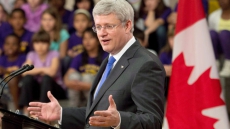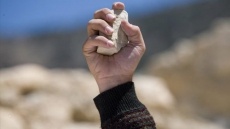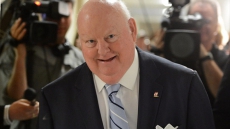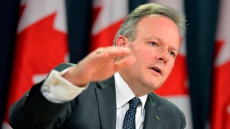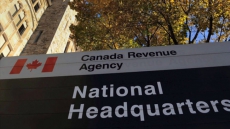OTTAWA - One by one, Conservative MPs in the House of Commons led by Prime Minister Stephen Harper voted late Tuesday to join the war in Iraq, passing a controversial motion that clears the way for Canadian CF-18s to embark on airstrikes in the Middle East.
After two days of debate, the motion to launch a combat mission against the militants of the Islamic State of Iraq and the Levant passed 157-134.
Some 155 Conservatives voted in favour of the motion, with the help of Independent MP Brent Rathgeber and Green MP Bruce Hyer, while the NDP and the Liberals were opposed. Liberal MP Irwin Cotler abstained from the vote.
"We do not take this step lightly," Harper said in a statement following the vote.
"It is imperative that we act with our allies to halt ISIL's spread in the region and reduce its capacity to launch terrorist attacks outside the region, including against Canada.
"Our government has a duty to protect Canadians and to shoulder our burden in efforts to combat threats such as ISIL. We must do our part."
Combat missions do not ordinarily require Commons approval, but Harper himself promised any combat mission, including airstrikes, would be subject to a debate and a vote.
In a statement of his own after the vote, NDP Leader Tom Mulcair accused the Conservatives of "plunging Canada into a prolonged war without a credible plan," and said the motion which expressly permits airstrikes in Syria too, with Syrian approval, exposes Canada to a bloody civil war in that country.
"Time and again, Conservatives have refused to answer clear questions and been evasive on critical details of this mission," Mulcair said.
"It is impossible to have confidence in the judgment of a prime minister who sends Canada into an unclear mission for an unspecified period, in an undefined area, with uncertain utility."
Canada had initially stayed out of the U.S.-led campaign against the now-notorious al-Qaida splinter group ISIL, which is currently in control of large swaths of territory in both Syria and Iraq.
A sustained bombing effort targeting ISIL positions began in August. The following month, Canada quietly announced it would provide up to 69 special forces "advisers" for 30 days to train Iraqi and Kurdish fighters currently battling the group. At last word, 26 of those troops were on the ground in Iraq.
Those soldiers will now be part of a broader six-month campaign that includes as many as six CF-18 fighter-bombers, two CP-140 surveillance planes, one refuelling aircraft and 600 personnel, but which expressly excludes the possibility of additional ground forces.
The Obama administration welcomed Canada's decision to provide fighter aircraft and other support for the coalition effort in Iraq.
In a statement late Tuesday, the White House said the U.S. is also grateful for intelligence, surveillance and reconnaissance aircraft provided by Canada.
"There is never a good time to go to war but there comes a time in every country's history where the necessity outweighs the risk and the urgency to defend our way of life, threatened as it is, must be defended," Justice Minister Peter MacKay said Tuesday during a second day of debate.
The government motion mentioned direct threats against Canada presumably a reference to a recently released ISIL video that mentions Canada, as well as an audio recording attributed to ISIL leader Abu Muhammad Al-Adnani that exhorted supporters to take up arms against "disbelievers."
"If you can kill a disbelieving American or European especially the spiteful and filthy French or an Australian, or a Canadian, or any other disbeliever from the disbelievers waging war, including the citizens of the countries that joined a coalition against the Islamic State, then rely upon Allah, and kill him in any manner or way however it may be," Al-Adnani said.
On the other side of the House, the Opposition NDP and the Liberals voted against the motion on the grounds that the Conservative government, maddeningly stingy with details about its plans, had failed to make a convincing case.
Cotler, however, issued a statement minutes before the vote saying that he would not be voting "on principled grounds." But while that statement detailed his reasons for not supporting the motion, it didn't explain why he didn't want to vote against it.
Cotler's abstention came after Liberal Leader Justin Trudeau had earlier said his entire caucus was voting against the motion.
"The (Liberal Party of Canada) disagrees with govt on how Canada can best help confront threat of ISIL. Tonight we voted against motion to send our Forces to war," Trudeau posted on Twitter after the vote.
"The members of the Canadian Armed Forces who will now go into harms way have our full and unwavering support."
The NDP had proposed an amendment that would have overhauled the motion entirely, focusing instead on supplying arms to local fighters and increasing humanitarian support. The amendment, however, was defeated 157-134.
During Tuesday's debate, New Democrat MPs expressed skepticism that Canada's contribution would end at six months of airstrikes.
"As we have seen in conflict after conflict after conflict, that becomes a slippery slope and that quickly evolves into boots on the ground," said NDP MP Peggy Nash.
"There are always reasons: 'We have to finish the job, we're not effective enough, there is more we could be doing.'"
The government needs to release more details about what else is going to happen beyond airstrikes, she added.
"We need to know what is the plan, what is the duration, is it going to help or hurt, are we dealing effectively with the humanitarian need. I think we have very many questions that have not adequately been addressed."
The Conservatives announced an increase in humanitarian aid to victims of the conflict on Monday, promising up to $10 million for victims of sexual violence.
The government says that since the beginning of 2014, more than $28 million has been allocated to humanitarian needs in Iraq.
The opposition parties say they will continue to press for more.
